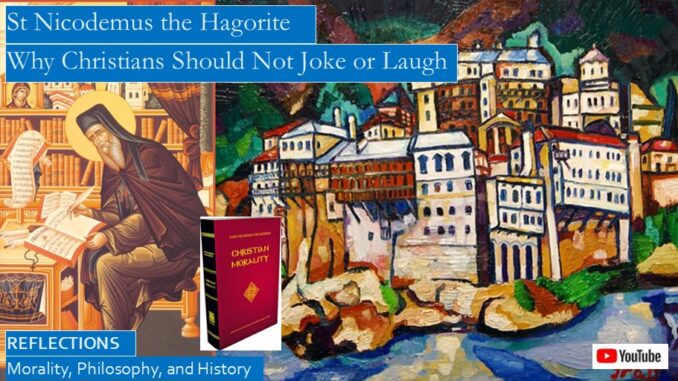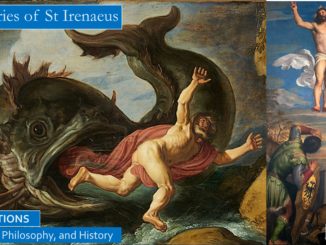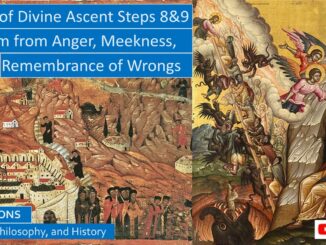
What can we learn when we reflect on the teachings of St Nicodemus the Hagiorite regarding slander?
In particular, should Christians avoid telling jokes, fables, jesting, laughing, and letting loose our emotions?
CHRISTIANS SHOULD NOT TELL JOKES
The full title of this chapter is: Concerning the fact that Christians should NOT engage in ribaldry, should not tell fables, and should not jest or guffaw. Perhaps this can also be translated as heartily laughing out loud.
Link to purchase On Christian Morality
https://ibmgs.org/patristic.html
Script for this video, with more Amazon book links: https://www.slideshare.net/BruceStrom1/st-nicodemus-of-the-holy-mountain-can-christians-laugh-and-joke
YouTube video for this blog: https://youtu.be/WAroedUiytY
YouTube video: St Nicodemus the Hagiorite, Do Not Bear False Witness, Do Not Slander
https://youtu.be/N7GmAMl0sDg
St Nicodemus was an eighteenth-century monk on Mount Athos in Greece, we can also assume that if he were alive today that he would advise Christians to be judicious in what movies and television programs they watch. We examined his view on the commandment against false witness and slander, and jokes and pranks can be a type of slander. Unlike the Egyptian monastic writings from many centuries before, St Nicodemus is clearly addressing both monastics and laymen, but he is clearly encouraging a monastic mindset, and his teachings on jokes and laughing will seem strict, but we can learn from them even if we do not follow them in their severe strictness. We explore the historical settings of his strict advice as well as a short biography in our initial video on St Nicodemus on the commandment, Do Not Slander.
St Nicodemus, Do Not Slander: https://youtu.be/N7GmAMl0sDg
Indeed, laymen can and should read the monastic classics, because living the Christian life is itself a type of monastic calling. But since laymen are NOT monks, you need to use common sense when applying the advice to your life situation, some minor allegorizing is needed. This is explored by St John Climacus in the first rung when climbing the Ladder of Divine Ascent, and this is also true for this work by St Nicodemus, although he does indicate he is writing his work for both monks and laymen.
Introduction to Ladder Of Divine Ascent: https://youtu.be/Fco0W3bt5GA
Also, the modern and medieval Greek world differ greatly, we have a much wider range of entertainment, and every weeknight you have your choice of many standup late-night programs. In Shakespeare’s time, many clerics warned against attending the theater because of the loose morals of the actors, and some of these complaints may have been warranted. We are not going to propose that Christians avoid all movies and television shows, though we will regard St Nicodemus’ teachings as valid warnings that these programs can pose spiritual dangers that we must be aware of and avoid.
St Nicodemus’ advice would also apply to the internet, if Christians view YouTube or TikTok or Facebook, they need to be aware that they are partially in control of what the channel feeds them, and Christians should definitely choose to tell the channel what content was objectionable. As Pope Francis teaches us in his encyclical Gaudete et Exsultate, we need to remind ourselves that we are responding to real people when we respond to posts on the internet, and we must respond with an attitude of Christian charity, just as we should when we talk to people in the flesh, and particularly when we respond to a post by a fellow Christian.
Pope Francis, Christians: Be kind on social media: https://youtu.be/jF-fsMvYsak
We must also be aware that contemplative monks, ancient, medieval, and modern, train themselves to be quiet and circumspect, and when they do speak, to speak slowly and cautiously, measuring each word, striving to a measure of perfection that may be impossible for laymen who must quickly answer to bosses, coworkers, family, and their children, who by necessity need to be quicker and more assertive in their speech. When we take this into account, St Nicodemus’ advice makes more sense.
TEACHINGS OF ST NICODEMUS
St Nicodemus begins: “The life of men is divided into two realms: the present and the future. The present life is a life of mourning and sorrow; the future life is a life of mirth and joy. The present life is full of afflictions and tears, while the future life is full of gladness and exultation. In our present life we sow, in our future life we reap. Our present life is filled with warfare and struggles, our future life is a time of victory and crowns. Now we live to follow the commandments of the Lord, in the future we will receive the rewards.”
We must ask the question, does this fellow have kids? If you have kids, you know they thrive in a childhood of mirth and joy. But no, St Nicodemus was a monk, he did not have kids, and rarely was around children.
This reminds me of contrasting experiences. My ex-wife grew up Baptist, so for a time we attended a Baptist Church, and on Wednesday nights they had a well-attended worship service that included AWANA, a kid’s program. Once I was asked to help out, and seeing the kids running round like crazy, I took the whistle, stopping them and scolding them, All of you are acting like children! To which one of them objected, But we are children! And I conceded that was true, and told them to carry on, and the bedlam continued louder than before.
Decades later, in contrast, I attended a contemplative Orthodox Wednesday night service, which is always poorly attended in most Orthodox churches, and nobody seems to mind. In fact, I never saw young children at this mid-week service, and when asked about this, the priest said that if a particularly devout parent forces their children to attend, the parents are scolded, because they did not want the children detesting going to church, Sunday morning was enough for kids. I am not condemning either practice, but the Orthodox contemplative services do require more self-discipline, the Orthodox do not wish for church to be fun.
St Nicodemus teaches that “there are three elements that characterize the life and state of a Christian: thought, speech, and deed.” He quotes St Gregory of Nyssa explaining this progression: Our thoughts are “origin of every word. Next is speech which reveals through our voice the thoughts we have imprinted on our soul.” Our deeds are the final reflection of our thoughts.
St Nicodemus teaches us that the speech of Christians who laugh at ribald jokes “is corrupted, since they fill their speech with obscene, indecent, shameless, and meretricious words.” Meretricious is a word that describes something that has apparent merit but lacks any value or integrity. A more archaic definition is that of an attractive prostitute, displaying enticing beauty on the outside, hiding a diseased reality on the inside. This archaic definition is apt because throughout this work, St Nicodemus especially condemns lewd humor and dirty jokes.
Likewise, regarding Christians who laugh at ribald jokes, “their thought is corrupted.” “Just as their words are crude and lewd, so also the thoughts and ideas in their souls are crude and lewd.” “Speech is a mirror, image, and imprint of the thoughts and inner disposition of the heart.” “He who utters obscene words churns up filth, mud and manure, which is spread first to himself, and then to those who hear it.”
As St John of the Ladders teaches us, “just as he who wears perfume is betrayed by their pleasant smell, so he who has the Spirit of the Lord is recognized by his works and his humility.”
St Nicodemus sees a possible progression that can ensnare our soul. “Often from an indecent word our mind entertains” indecent thoughts; “from entertainment it gives assent; from assent it succumbs to evil deeds; from evil deeds it develops a proclivity for sin, forming a bad habit; bad habits descend into uncaring impenitence, which leads to despair; and from despair our soul is flung into Hell and perdition.” “What a great fire is ignited by the small flame from a shameful tongue.”
This same progression in seen in the Decalogue. First, our thoughts and attitudes should be holy, we should remember that God is ruler of our lives, we should honor our parents and those in authority, we should not covet or envy, as envy is the sin that leads to all other sins against our neighbor. Second, our words should be holy, we should not curse God, or take His Name in vain, we should not bear false witness against our neighbor or slander his reputation. Third, our deeds should be holy, we should love our neighbor as ourselves, we shall not murder or mistreat or adulter or steal from our neighbor.
Series of Decalogue videos: https://youtube.com/playlist?list=PLJVlY2bjK8li1ULMrgL23X-iA5aCENq6i
St Nicodemus teaches us, “Strive to become worthy of the holy name of Christians through our Christian words and your holy deeds.” Can you be both “Christian and comedian, Christian and jester, Christian and buffoon?” Can you be a Christian if you study the faults of your neighbor, searching for words or deeds to ridicule for laughs?
St Basil notes in His time on earth, the “Lord experienced those emotions that arise from the flesh, and those that attest to virtue, such as weariness and pity for the afflicted,” but in the “Gospels, at no time did he consent to laugh,” although the Scriptures records that Jesus wept four times.
Likewise, Jesus in the Sermon on the Plain, exhorts:
“Blessed are you that weep now, for you shall laugh.”
“Woe to you that laugh now, for you shall mourn and weep.”[1]
Youtube WOKE Bible verses:
https://youtu.be/576TYemgA8o
St Nicodemus challenges us, “Do you hear, you who jest? Do you hear, you who laugh? Christ wept, not for His own sins, but for the sins of mankind, and you not only do not bewail your sins, but laugh?”
St Nicodemus expresses an extreme position: “You should give up jesting, buffoonery, and laughter, if you desire to be truly Christians, imitators and disciples of Jesus Christ; for if you do not give these up, you are not truly Christians, but falsely so, and you are not genuine disciples of Christ, but spurious ones.” The translators in a footnote contrast that with the discussion in Aristotle where levity is a virtue that lies between the extremes of boorishness and buffoonery. The translators contrast this with the Christian teaching that we should “abhor levity as a vice contrary to the Christian life.”
But St Nicodemus then relents, teaching us that “man cannot be always downcast and dejected, but needs at times to transform his dejection into a gladsome attitude with cheerful words.” “Content yourself with smiling and grinning, as prudent and judicious people do, just as the wise Sirach says, ‘A fool lifts up his voice with laughter; but a wise man scarcely smiles a little.”
Christians should especially not laugh or jest in Church. St Nicodemus teaches us, “when Christians enter the Church, the Temple of God, should believe that they are entering Heaven itself,” “and should offer their prayers to God with tears and sighs,” seeking forgiveness of their sins. “If he who prays carelessly angers and incenses God, how much more does he anger God who converses, jokes, and laughs at the time of prayer,” and worse, in Church.[2]
CAN MODERN CHRISTIANS TELL JOKES?
Can modern Christians tell jokes? Should we listen to the jokes of standup comics and late-night talk show hosts?
I remember years ago I paid to be entertained by a nightclub standup comic that was billed as not being offensive, but to me his lewd and cruel jokes were just too much, but I must admit I was the most sensitive person there, I was the only one who walked out and stood in the lobby, I just could not bear to listen to toxic humor.
Among the comics, Jerry Seinfeld is the most benign, as his comedy invites the audience to laugh at themselves personally, and at our modern cultural norms.
Can Christians tell jokes? Perhaps the best way to answer is with another key question: What are your motives? Do you seek to harm the reputation of your neighbor, something priceless and often permanent? Or do you seek to mock the Church? For fleeting laughs and chuckles? Sometimes humor and jokes can teach moral lessons, and as an example we will retell several Catholic jokes we found on the Breaking the Habit channel.
https://www.youtube.com/watch?v=kAbsdqgCks&t=338s
The first joke is about a nun who is a teacher in a Catholic school asks her young students what they want to be when they grew up. One girl says she wants to be a prostitute. The nun hesitates, and asks her again, and once again, the girl says she wants to be a prostitute when she grows up.
The nun says, what a relief, I thought you said you want to be a Protestant.
The moral lesson is Christians should first seek how to become better Christians and not to be overly concerned about whether your neighbors are true Christians, and whether your church is the true church, and whether the Christians in our church are the true Christians, which is a key objective of our channel.
Our Channel Philosophy: https://youtu.be/Si0TsO5bNr0
In the next joke, A Catholic goes into a bar and orders three beers, which he quietly drinks by himself. After a few months, the bartender is curious, and asks why he does this. The Catholic explains that he had a group of friends in college, and they drank a beer in a pub each Friday night. When they graduated, they each went their separate ways, they each were offered jobs in different cities, but they promised each other that each week they would each drink three beers in a pub to commemorate their friendship.
Some months later he only orders two beers, and after a month of only two beers, the bartender says he is sorry for his loss. The man is puzzled and asks what he means. The bartender, sadly say, Why, one of your friends must have passed away. The man says, “Oh no, I am Catholic, and my friends are not, and this is Lent, and I don’t drink beer during Lent.”
The moral lesson is that Lent should merely intensify our year-long strivings to live a virtuous life, we will not benefit from the added discipline of Lent if it is merely a ceremonial exercise, perhaps only for show.
In the next joke, two promiscuous boys go to confession, the first boy goes in and confesses to impure thoughts, but the second boy is more truthful, he confesses that he has been dallying with some of the girls in his class. The priest asks, Is it Tiffany? You need to watch out for Tiffany. How about Stephanie? How about Melanie? You need to avoid these girls.
The two boys compared how tough the priest was, and the first boy said he was very tough, he was instructed to pray twelve Hail Maries. The second boy said that he was also sentenced to praying twelve Hail Maries, but that he was also given three good leads.
The moral lessons are that if you complain about the repetitiveness and meaningless of Catholic Confession, that is not the Church’s fault, nor is it the priest’s, the fault lies with you. And, most importantly, you can slander someone’s reputation even when you are telling the truth about them.
DISCUSSING THE SOURCES
We discussed our sources in our first video on St Nicodemus and his work, On Christian Morality.
video
We are also planning a reflection on St Nicodemus’ teachings on whether Christians should ascent to being entertained and be involved with some of the frivolities of the world, which is really a continuation of the ancient debate of Stoicism vs Epicureanism.
Epicurus and Epicureans: https://youtu.be/49Qv3Be86Jw
Stoic Philosopher Seneca: https://youtu.be/m4mcP2F9c4w
Stoic Philosopher Epictetus: https://youtu.be/Dhd543kov-E
Stoic Philosopher Marcus Aurelius: https://youtu.be/0qHpReZYhv4
[1] https://www.biblegateway.com/passage/?search=Luke+6%3A20-26&version=RSVCE
[2] St Nicodemus the Hagiorite, Christian Morality, translated by Hieromonk Father Patapios, Monk Father Chrysostomos, and Archbishop Chrysostomos (Belmont, Massachusetts, Institute for Byzantine and Modern Greek Studies, 1803, 2012), Discourse VII, pp. 179-220, and the Aristotle footnote is for Nicomachean Ethics, Book IV, Chapter 8, 1128a32.




2 Trackbacks / Pingbacks